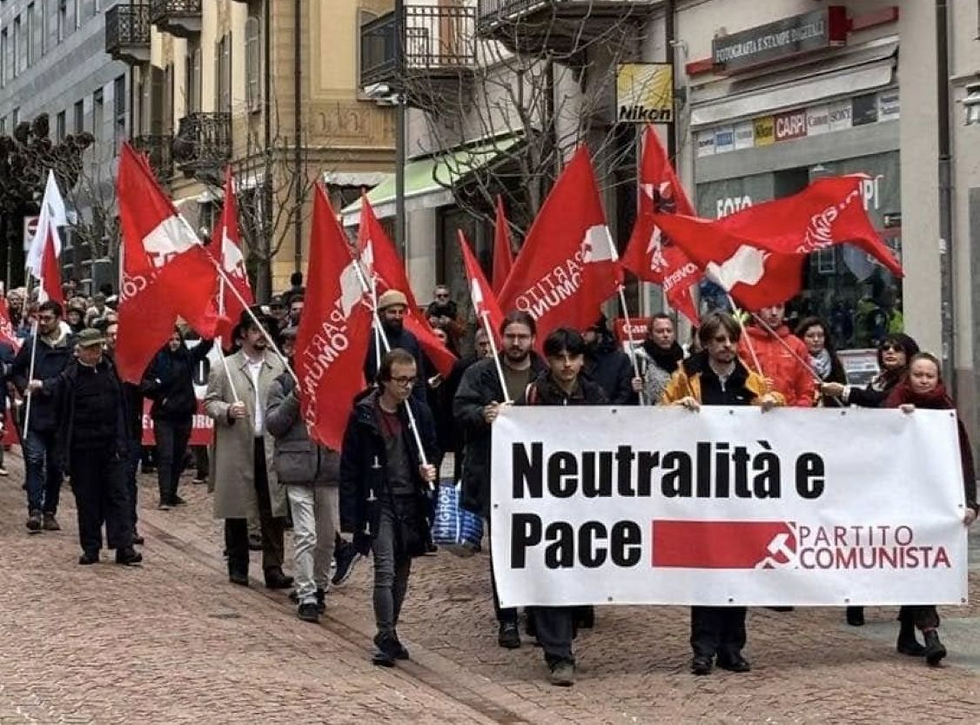25th Congress of the Communist Party (Switzerland) to be held November 8-9
- The Left Chapter

- 3 hours ago
- 3 min read

Communist Party of Switzerland march on March 15, 2025
The 25th Congress of the Communist Party (Switzerland) will take place next weekend (8–9 November 2025) in Arbedo-Castione. The Congress will be divided into two sessions: an initial public session (attended also by some international guests) and a second session reserved for delegates only. The Congress will focus on three priorities — neutrality, peace, and labour — emphasizing on the one hand the need to end the arms race, which diverts resources from education and public healthcare, and to diversify international relations with emerging countries (BRICS+, etc.) while avoiding alignment with NATO; and on the other hand reaffirming the importance of strengthening the Party’s roots within the workers’ movement.
In addition to planning future activities, the Congress will also serve as an opportunity to review the past four years: the Party’s last regular Congress took place in 2021, and since then the Communist Party has experienced significant growth — not only institutionally (with two members of the Canton Ticino's Parliament in Southern Switzerland, one municipal minister, and seventeen town councillors) but also in terms of activism, particularly among youth and within the trade union movement.
Among the guests expected at the Congress — alongside representatives of other Swiss parties and trade unions — are leaders of the Portuguese Communist Party, the German Communist Party, the Hungarian Workers’ Party, and other guests from Denmark, France, Spain, Italy, as well as representatives of the Sri Lankan, Lebanese, and Turkish migrant communities living in Switzerland. Diplomatic delegations from the People’s Republic of China, Cuba, and Nicaragua are also expected in Arbedo-Castione. Messages of solidarity have already arrived, for example, from the Communist Party of Ukraine led by Petro Symonenko — forced into illegality under the Zelensky regime — with more greetings expected in the coming hours.
The Congress will open with a greeting from artist Moni Ovadia, an anti-Zionist activist of Jewish origin. Also present in Arbedo-Castione will be a representative of Italy’s Unione Sindacale di Base (USB), known for its actions opposing the shipment of materials to Israel from the port of Genoa.
The main organizational change will be the expansion of the Central Committee, the Party’s “parliament”, whose membership will increase from 20 to 30, with an average age just over 30. This change aims to better reflect the growing number of Party members. The Congress will also elect the Party’s General Secretary, a position held since 2009 by M.P. Massimiliano Ay, who is seeking re-election.
Beyond the Party’s general strategy, several specific resolutions will be debated:
The first session will discuss a resolution by comrade Alberto Togni entitled “A Patriotic and Peace-Oriented Left: No to the EU – No to NATO”. This resolution reaffirms the Communist Party’s opposition to the Bilateral Agreements III between Switzerland and the EU — calling for a mandatory referendum — and its support for the Neutrality Initiative. It further consolidates the Party’s strategic line as the only left-wing force embracing working-class patriotism and placing two priorities on an equal footing: (1) the defense of national sovereignty and neutrality, and (2) the defense of workers’ rights.
The second session will discuss additional thematic resolutions, including one by comrade Rudi Kolb-Alves on digital sovereignty, addressing both the development of productive forces and labor rights as well as national independence. Other resolutions will focus on gender equality in wages and social rights, and on public health policy.
The Party will also continue its active work among students — represented by a delegation of the Independent Union of Students and Apprentices (SISA) led by coordinators Ismael Camozzi and Filippo Beroggi — reaffirming support for the referendum to save alternative service to compulsory enlistment in the Swiss army. It will also assess the situation in the public services and construction sectors, exploring how to strengthen its presence and oppose budget cuts.
Finally, a complete revision of the Party Statutes is planned. In addition to facilitating the Party’s organization on a Swiss federal level, the new Statutes will include Swiss neutrality among the Party’s core objectives, alongside the principles of scientific socialism and Marxism-Leninism.







Comments